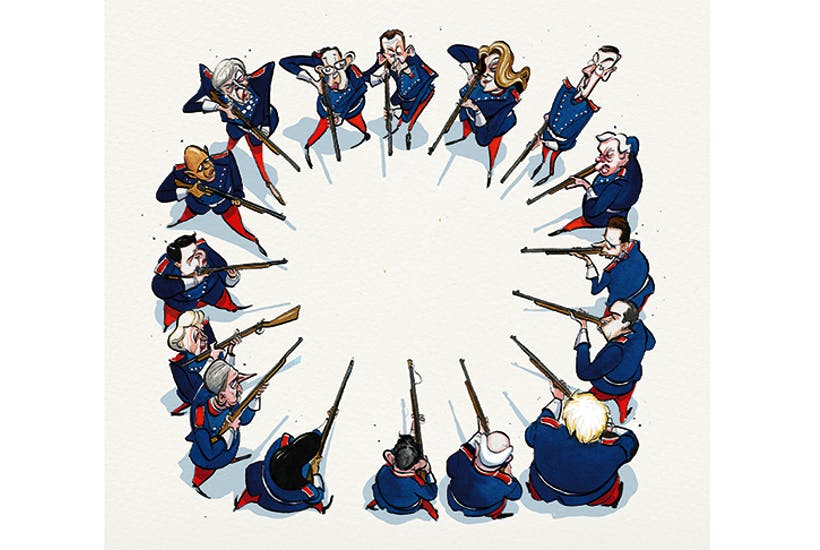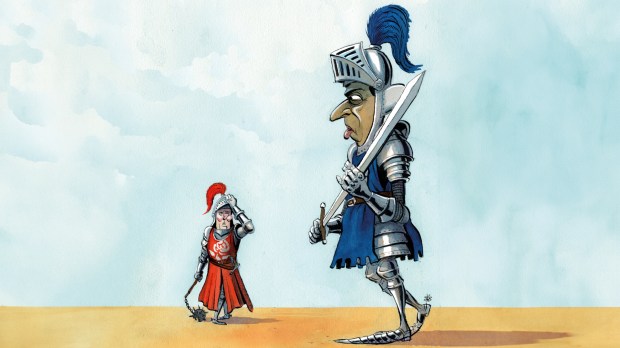To most of the cabinet, it does not matter if Theresa May announces a timetable for her resignation: they can’t see her lasting until the summer and the race for her successor is now on. Coffees are being bought, dinners laid on, allies sounded out — all in expectation of a contest being called at any moment.
This time, the leading candidates hope to be ready with campaign managers, teams, manifestos and more. Even those holding back are doing so strategically. And given that this is the Conservative party, there will be blood.
If there is a general election this year, Tories are adamant that May won’t lead them into it. ‘There is a strong sense that she shouldn’t lead us into an election anytime, anywhere, any place,’ explains a member of government. There’s talk of fast-tracking the Tory leadership procedure, finishing the hustings in the space of a week. Under current rules, the membership would then pick between the final two — but time constraints might see MPs decide or the 124,000 members consulted in an online ballot.
They’ll be spoiled for choice. Half the cabinet are expected to try their luck, while a cluster of less experienced candidates will argue there’s a clear case for a fresh face moving the party on to a new chapter. They might run not to win but to secure a promotion — although even this is a gamble. ‘Less than ten votes is more of a humiliation than a career boost,’ warns one MP.
For now, stealth is all. Each candidate needs to build support without being seen to do so. No one wants to be the frontrunner in a Tory leadership contest, as it places a target on you. Just ask Sajid Javid. Promoted to Home Secretary in the wake of the Windrush scandal, he had been seen as the favourite thanks to his Thatcherite principles and backstory as the son of a Pakistani bus driver. As a result, his star is now waning — his decision to revoke Isis bride Shamima Begum’s citizenship dismissed by many colleagues as leadership manoeuvring and an example of tone-deaf politics.
Jeremy Hunt has been putting in the hours and recently spoke to Iain Duncan Smith’s social justice caucus of Tory MPs. They heard about his driving desire to help the poorest in society, and his past charity work. But he voted Remain, which may damage his chances. Dominic Raab, a committed Brexiteer, is viewed as having the most advanced campaign. MPs report being approached by his foot soldiers for one-on-one meetings. The pitch? As a true Brexiteer and fresh face, Raab is the change the party needs.
Raab’s efforts mean that fellow Brexiteer Boris Johnson is falling behind. Johnson is a hit with the Tory grassroots, but he has done little to ingratiate himself with fellow MPs in recent months and is seldom seen in the parliament bars. ‘He hasn’t made an effort to get to know the 2015/17 intake — which is crucial,’ says one MP. (They now constitute almost a third of the parliamentary party.)
Both Raab and Johnson loathe May’s deal, so there is space in the market for a pragmatic Brexiteer who can pose as a unifier. Allies of Andrea Leadsom suggest this could be her pitch; others point to Michael Gove, who is enjoying a renaissance after a string of barnstorming appearances at the despatch box.
With a range of Tories threatening to quit the party if an arch-Brexiteer takes over, running mates will also matter. Amber Rudd, who voted Remain but has said the next leader should be a Brexiteer, is seen as a potential kingmaker who could bring votes with her. She is close to Johnson and Gove. Allies suggest a ‘BAmber’ (Boris/Amber) ticket would be a formidable force.
All this posturing might seem a little self-indulgent in the current climate: even the Tories recognise that. But they also recognise that they chose the wrong leader last time and cannot afford to make the same mistake again.
Got something to add? Join the discussion and comment below.
Get 10 issues for just $10
Subscribe to The Spectator Australia today for the next 10 magazine issues, plus full online access, for just $10.
You might disagree with half of it, but you’ll enjoy reading all of it. Try your first month for free, then just $2 a week for the remainder of your first year.















Comments
Don't miss out
Join the conversation with other Spectator Australia readers. Subscribe to leave a comment.
SUBSCRIBEAlready a subscriber? Log in